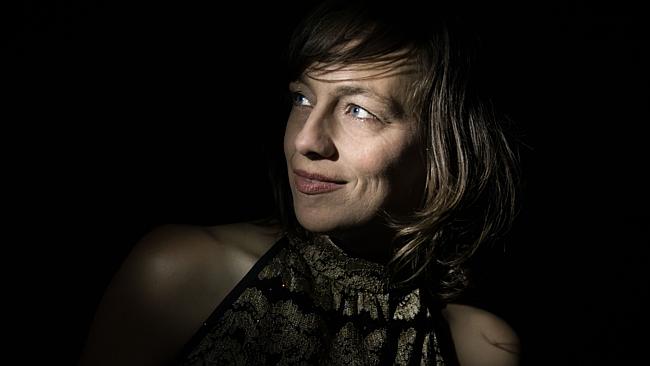I love Lucie, here’s why you will too

Growing up surrounded by poetry stood Lucie Thorne in good stead for songwriting.
Source: Supplied
THIS week’s album reviews from The Courier-Mail (ratings out of five stars):
ROCK
Lucie Thorne, Everything Sings Tonight
(Vitamin) ****
There is a quiet, contemplative beauty in much of Australian songwriter Lucie Thorne’s music. Strong, precise visual images. An intimate vocal delivery that feels as though you are being invited to listen in on private thoughts set against sparse musical settings, often just her intricate electric guitar and the drums of Hamish Stuart.
Thorne started working with Stuart for 2008’s breakthrough set Black Across The Field and for the past five years they have worked as a duo, happy with the freedom it gives. That makes the live show always interesting for Thorne and the listener; it’s not improvisation but no song is ever quite the same from night to night.
The duo setup gives them the kind of flexibility most bands would love to have. On tour in Germany, Thorne booked time in a studio without any grand plan or knowing what the result would be. She walked out two days later with most of this album completed, including a song only written the day before recording. That’s Everything Sings, the six-minute centrepiece to this album that glows like a candle in a dark night.
Thorne grew up surrounded by poetry and poets (her father is Tasmanian poet Tim Thorne). On tour in Romania she returned to T.S. Eliot’s What The Thunder Said, which concludes his epic poem The Waste Land. That seeped into Everything Sings and the recording of the song includes spoken-word recitations from the poem, one in Romanian by her father and one by American songwriter Greg Brown. It’s a suitably obtuse detail for an Eliot reference but it works.
That is followed by Lasseter’s Gold, which takes inspiration a long way from Bucharest: Alice Springs. Here the palette is expanded with bass guitar, Chris Abraham’s warm organ flutter and some strikingly beautiful lead guitar, slow, sure, Knopfler-esque. The lyric spins off the detail of Lasseters casino, in Alice Springs, being named after the prospector Harold Lasseter, who died in the western desert still trying to find the fabled gold reef he claimed to have stumbled on as a young man.
Thorne has always resisted being called a poet but her rich but never overworked lyrics crackle with poetic intensity, the thunder cracks that “rumble from a graphite sky’’, the “street light drips that smudge the stars’’.
Some songs make their meaning plain, the vivid picture of returning to a seaside town and “the streets we walked together’’ in Darlin’ If We Could, the dreams of someone far away in Up All Night.
We live in a cluttered age, cluttered with possessions, information, choices. With simplicity and clarity Thorne’s music and words cut through all that. The listener comes out the other side feeling refreshed.
She told me in an interview that she is always trying to find the balance between shining enough light on a subject for the listener to feel connected to it while leaving enough room for people to bring their own experience to it.
She hits that sweet spot with the 10 songs on Everything Sings Tonight.
Lucie Thorne plays Junk Bar, Ashgrove, tomorrow, 7pm; www.trybooking.com
Noel Mengel
CLASSICAL
Various Artists, Classic 100 — Swoon
(ABC Classics) ****1/2
Well did the poet observe that our sweetest songs are those telling of saddest thoughts. Such music dominates listeners’ choices on ABC-FM radio’s 2015 Classic 100 Swoon survey featured on this eight CD plus DVD set. Topping the list is The Lark Ascending, by Ralph Vaughan Williams, who was arrested as a suspected spy after being spotted jotting notes for the piece as he strolled along England’s coast on the day World War I started. The music’s evocative beauty is captured in Australian violinist Dimity Hall’s exquisite performance with Sinfonia Australis, Antony Walker conducting. Arvo Part’s Spiegel im Spiegel — Mirror within Mirror, Cantus in memoriam Benjamin Britten, Gorecki’s heart-rending Symphony of Sorrowful Songs, Ravel’s Pavane for a Dead Princess, Nigel Westlake’s pensive Wooden Ships and Tavener’s Song for Athene, featuring Australian orchestras, soloists and international conductors, are just some of the gems in this set brimming with many swoon moments.
Patricia Kelly
ROCK
Spin Doctors, Songs From the Road
(Ruf Records) ***
Considering the bluesy twang on their early ’90s hits Little Miss Can’t Be Wrong, Two Princes and Jimmy Olsen’s Blues, it’s little surprise that Spin Doctors actually started out as a blues band. Two years ago they got back to those roots with the blues album If the River Was Whiskey, and now this release from Ruf Records’ Songs From the Road series of live albums finds them road-testing the new tunes at the Harmonie Club in Bonn, Germany. If not for frontman Chris Barron’s frequent “danke schons” you’d think the boys were back playing the old New York blues bars, as Eric Schenkman’s masterful guitar work drives proceedings. Bluesy highlights include Some Other Man Instead, About a Train and the title track from the aforementioned If the River Was Whiskey. It’s not purely blues, however: They channel Red Hot Chili Peppers on opener What Time Is It? and The Police on Traction Blues. Naturally those aforementioned megahits get an airing also. The album is accompanied by a DVD.
John O’Brien
Pulsating Time Fibre by Primitive Motion
ELECTRONIC
Primitive Motion, Pulsating Time Fibre
(Bedroom Suck) ****
The home studio is the new garage rock: neighbour-friendly and with no drum kits to lug up the driveway. Brisbane has always had a multitude of explorers in this DIY world and Primitive Motion, the duo of Leighton Craig and Sandra Selig, are among the most exciting. Their sighing melodies float amid a selection of synth and early drum machine sounds that owe more to Krautrock and new wave synth explorers, circa ’79, than modern electronica. Bodies of the Placid Furnace opens with hypnotic guitar and concludes with synthesiser sirens that leave the listener suspended in outer — or perhaps inner — space. Then follows 10 concise tracks, mostly less than two minutes, before the album opens out to the splendours of the concluding four tracks, including album centrepoint To Shape a Single Leaf, a nine-minute aural bath of tension and release that could serve as a suitable alternate soundtrack to scenes from 2001. Primitive Motion’s music takes you out of yourself and into some other realm. Bring the headphones: it’s quite a trip.
Noel Mengel
JAZZ
Barney McAll, Mooroolbark
(ABC Music) ****
Melbourne-raised pianist McAll moved to New York in 1997, working with artists as varied as Sia and Dewey Redman as well as writing film scores. He returned to Australia last year and has lost no time in assembling a cast of some of Australia’s finest jazz players. Here he reflects on the suburb of his youth and naturally enough his music has a filmic kind of quality: it’s not about blazing solos but compositional skill and ensemble playing. Nectar Spur uses wordless vocals to enhance its hypnotic quality. Saxophonist Julien Wilson plays a key role, reinforcing the melody of February while the band explores complex rhythms below and leading the way through the late-night grooves of Coast Road. On Jendhi
Stephen Magnusson’s electric guitar flashes like lightning across the landscape, out in the fringes between Weather Report and Radiohead. The final track features Barney, aged eight, playing boogie woogie at the piano at his childhood home, neatly rounding off a musical journey that builds on the past while looking to the future.
Noel Mengel
Sundown Over Ghost Town by Eilen Jewell
COUNTRY
Eilen Jewell, Sundown Over Ghost Town
(Signature Sounds) ****
Eilen Jewell sounds as though she stepped straight out of 1963 with a droll delivery influenced by Billie Holiday and Bessie Smith and wonderfully retro soundscapes that mix blues, old-time country, rockabilly and twangy surf music. She is no slouch as a writer either and the stellar album Queen of the Minor Key (2011) sharpened her ability to craft bleakly poetic songs about loners, drifters and gangster molls. This new release is a more sombre and introspective set and was recorded after Jewell returned from Boston to her home state of Idaho to raise an infant daughter. Struggle and decay abound, from the evicted farmers of Half-Broke Horse, the “mocking blue sky’’ and parched sand of Rio Grande, to the wasted landscape of Green Hills where empty silos stand in “towns too barren for ghosts’’. Comfort comes from childhood memories of sprinklers and ice-cream trucks (My Hometown) and her daughter (Songbird). Jewell’s band is uniformly excellent with the reverbed guitar of Jerry Miller a standout.
David Costello
ROOTS
Pokey LaFarge, Something in the Water
(Rounder) ***1/2
With homegrown primitivist C.W. Stoneking having alerted Australian ears to retro Americana, it’s instructive to hear the real thing done with reverence, authenticity and dexterity. At only 32, Pokey LaFarge already has seven albums to his name and has appeared on Jack White’s 2012 album Blunderbuss and the soundtrack of HBO series Boardwalk Empire
. While
Something in the Water offers more of the same, LaFarge and his band do it with such humour and panache that it’s easy to overlook its old-time novelty value. Complementing a reedy vocal quaver that echoes his heroes Jimmie Rodgers, Skip James and Sleepy John Estes, LaFarge also plays guitar and six-string banjo, with his crack sextet adding vintage instruments such as upright bass, washboard and cornet to the mix, plus baritone horns, piano, harmonica and drums. For an authentic taste of Prohibition-era riverboat soul, vaudeville, ragtime blues and western swing, sample the title track, the rust-encrusted Cairo, Illinois, and the lascivious Bad Girl.
Phil Stafford









